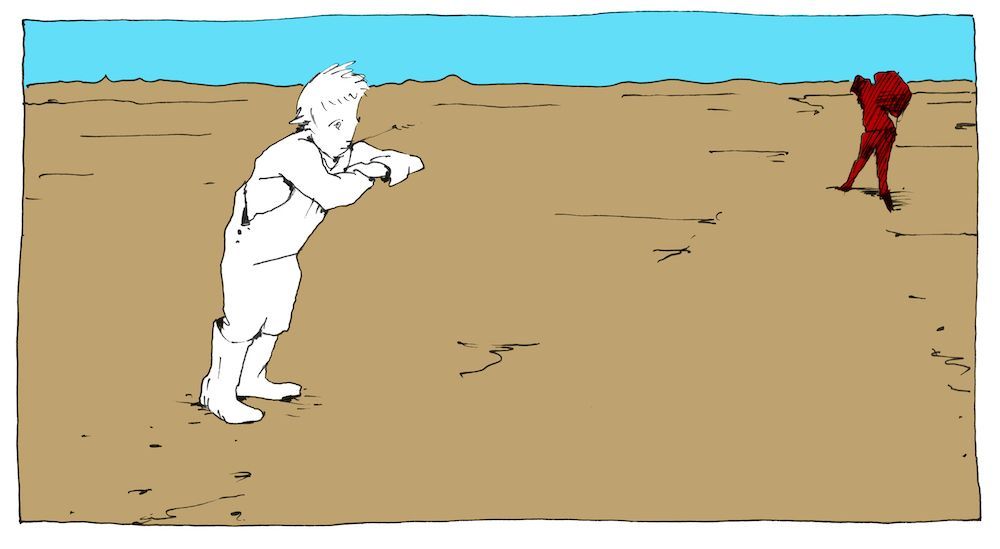About the group
The research group "Border Readings" brings together literary and other scholars in order to investigate how literature and other art forms help us meet borders, often with the help of textual boundaries and framings.
Borders are constantly in the news, whether it concerns migration, the covid-19 pandemic or Brexit. Together with their variants in the forms of boundaries, limits, frontiers, frames and thresholds, they are also fundamental to our dealings with the world on many different levels.
We can think in terms of borders of national territories, but also of places, houses, bodies and even texts. We can experience differences as borders. As we age we cross the borders between different life stages, and what we experience and know is limited by the borders of perception and cognition.
Research interests
The research group will investigate the following questions:
- How do readers and authors use literature and narrative to negotiate borders on different scales?
- How do the narrative and material borders of literary texts work together with borders described in the texts in acts of reading?
- How does literature and other art forms contribute to imagining new concepts of borders?
- How does literature address and enact cognition and emotions in response to borders?
Activities
Two lectures by Lecturer Dr. Barbara Siller of University College Cork, Oslo 28 & 30 March 2023, in collaboration with the research groups Multilingualism and Multiculturalism in Central Europe and the Balkans and Migration, borders and identity in discourses and narratives: Subversion of Borders through a Multilingual Aesthetics in German and Italian Literary Texts from South Tyrol and Kafka Tales of the Twenty-First Century
The group will help arrange the SOVEL conference Trauma, Memory, and Counter-Culture: Borders and Border Transgressions in (Post-)Communist Europe, Oslo June 1-2, 2023. See Call for Papers. Submission Deadline: 23 Dec 2022.
In 2022 the group helped arrange the third of three workshops in the NOS-HS workshop project ‘Temporalities and Subjectivities of Crossing: Contemporary Public Migration Narratives in Europe’.
At present the group's reading group meets regularly to discuss relevant research publications and to comment work in progress by group participants.
Fellowships
Doctoral research fellows
The Border Readings research group’s host department, the Department of Literature, Area Studies and European Languages (ILOS), occasionally announces PhD fellowships.
Please note: To be enrolled in a Norwegian PhD programme you must have acquired an announced fellowship or provide proof of alternative financing of a full-time position as research fellow. For more details see Application and Admission PhD.
Marie Skłodowska-Curie Action postdocs
The research group is interested in hosting Marie Skłodowska-Curie Action postdoc fellows from across the world, and has the capacity to work with together with a limited number of qualified researchers on applications every year. You must send us a 1-page project sketch and a 1-page academic career plan (including your qualifications, where you see yourself in ten years, and a list of areas where a stay at the department would help develop your qualifications) by 1 February, if you wish to be considered for working with us on an application the same year.
Associated projects
Reading the Unkown
In collaboration with Literature, Cognition and Emotions, we bring together border poetics with cognitive approaches to literature to investigate how reading helps us approach different unkowns: the unknowns in ourselves and others, unknown spaces and unknown futures.
Soviet Ellipses
Omissions as Techniques of Border Transgression in Photography, Literature, and Everyday Life (SOVEL). A project carried out by Marie Skłodowska Curie Fellow Dr. Vera Faber.
Temporalities and Subjectivities of Crossing
Temporalities and Subjectivities of Crossing: Contemporary Public Migration Narratives in Europe. A NOS-HS workshop series initiated by the research group “Migration, Borders and Identity”.
Border Poetics Bibliography
A web bibliography of studies and primary material focusing on borders and literature along with other relevant topics, in collaboration with the previous research group “Migration, Borders and Identity”. Go to the Border Poetics Bibliography
Collaborators
- The research and teaching initiative Literature, Cognition and Emotions (LCE), University of Oslo
- The research group Migration, Borders and Identity in Discourses and Narratives, University of Oslo
- The research group Multilingualism and Multiculturalism in Central Europe and the Balkans, University of Oslo
- UniGR - Centre for Border Studies, University of the Greater Region
- The research group Border Poetics / Border Culture, UiT Arctic University of Norway
- The research community Borders, Mobilities and Cultural Encounters BOMOCULT, University of Eastern Finland
- The ERC research project REEL borders, Vrije Universiteit Brussel
- The research network Fringe Urban Narratives, Universidad de Alcalá
